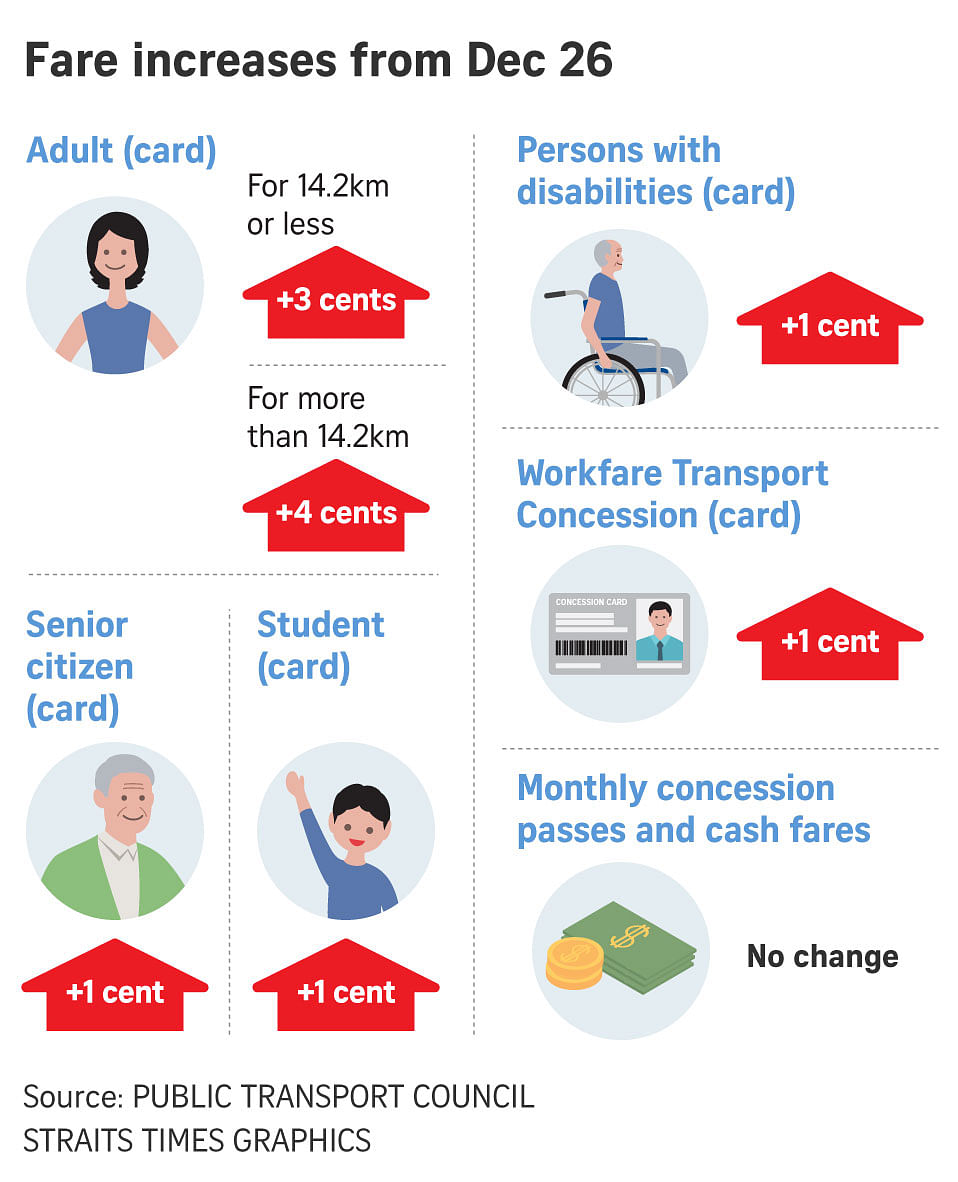Train, bus fare formula will continue to exclude drop in ridership due to Covid-19: PTC

Kok Yufeng and Clement Yong
- PUBLISHED
NOV 3, 2021, 8:56 PM SGT
SINGAPORE - The way that bus and train fares are calculated next year will continue to be adjusted to exclude the exceptionally sharp fall in ridership seen during the Covid-19 pandemic, said the Public Transport Council (PTC).
PTC chief executive Tan Kim Hong said on Wednesday (Nov 3) that the council will adopt the same principle as it did this year when calculating the network capacity factor (NCF) for next year's annual fare review.
The NCF - which was introduced to the fare formula in 2018 and measures the distance covered by bus and train trips versus usage - is meant to account for the change in operating costs arising from adjustments to public transport network capacity.
For this year's review, the PTC considered only the month of January 2020 when deriving the NCF as it was the only month when ridership was not affected by the pandemic.
The PTC excluded the other 11 months of 2020 in its calculations.
This resulted in a 2.2 per cent increase in fares this year, rather than a 51.5 per cent increase if the full year of 2020 was factored in.
The current fare formula, which is valid until next year, also factors in core inflation, energy prices, productivity and wage growth.
Mr Tan said at a press conference that ridership in 2021 is still affected by the pandemic. "We are still monitoring the data and the same principle will be used to exclude the periods that are affected."
Ridership was around 60 per cent of pre-pandemic levels in September. This is likely to remain the case as people continue working from home.
Meanwhile, energy prices have spiked and wages continue to increase.
Asked about the likelihood of another fare hike next year, Mr Tan said the fare formula provides a cap on fare adjustments that can be made each year.
In the event of a higher cap, 5 per cent for instance, the PTC is not obliged to grant the full amount and will look at the prevailing situation.
With the current fare formula up for review next year, the council was also asked what changes could be made to the formula.
PTC chairman Richard Magnus was coy about what the new fare formula could include. "The broad direction... is to really look at how we can arrive at a comfortable balance despite the tensions (between affordability and cost)," he said.
The PTC has noted the growing phenomenon of people working from home, but the long-term trend is still not clear and it does not mean that people will not travel on public transport for other reasons in future, he added.
Public transport fare hike: PTC says unable to keep deferring increases | THE BIG STORY
Income ceiling raised so more households can receive public transport vouchers
Public transport fares to rise by 3 to 4 cents for adults from Dec 26
If rising costs and lower ridership are indeed the new normal, Mr Magnus said public transport operators will need to relook how they can generate more revenue and cut down costs.Mr Tan said a fall in peak-hour demand could be an opportunity for operators to improve financial viability as they adjust capacity to be more cost-efficient. They could also look into bulk buying, automation and increasing energy efficiency to reduce costs further.
He added that the fare revision is not meant to fully offset operating costs, but to help cover part of it during this pandemic.
Asked why taxpayers have been keeping operators afloat via $2 billion in subsidies each year, Mr Magnus said public transport is a public good. Allowing market forces to dictate fares would mean higher fare prices, he added, citing public transport fares in London.
"There is a social consideration here that we have to price the system such that it does not deny any Singaporeans from travelling (on public transport)," Mr Tan said.
Commuters disappointed at public transport fare hikes; experts say next increase could be more
LTA deficit widens as fare revenue shrinks on back of Covid-19 pandemic
Operators SMRT and SBS Transit both applied for the full 2.2 per cent fare increase.SMRT Trains president Lam Sheau Kai said the firm is grateful for the support given to it.
Ms Tammy Tan, SBS Transit's senior vice-president for corporate communications, said the fare hike will help the firm defray cost increases that are unsustainable in the long run, including those incurred from stepped-up cleaning and disinfection schedules due to the pandemic.

Join ST's Telegram channel here and get the latest breaking news delivered to you.



